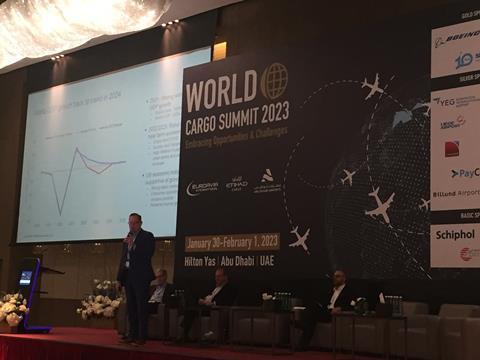
During a debate at the World Cargo Summit the question was raised as to whether the freighter market was becoming a bubble.
Speaking to delegates during the break there were many that had this same question given the number of aircraft that had been ordered over the last couple of years.
The freighter manufacturer/conversion firms that were asked this question during the debate were wary, but they also said there were reasons to remain positive.
Jim Gibbs, president, Kansas Modification Center, which has launched a B777 conversion programme, felt that the narrowbody market was facing a bubble but that the widebody market was in a stronger position.
“The smaller aircraft, the narrowbodies such as the B737s, the A321s and conversions, can be built much faster than widebody conversions and so I do see a bubble in the next three to five years because the production rate will quickly outrun the need for capacity.
“On the widebody aspect, it is much more difficult to build and there is much more capacity coming off the market with the older B747 freighters and items such as that.
“So for the widebody market, the need for the bigger freighters on the longer routes will continue.”
Brian Hermesmeyer, director – product marketing and freighter customer lead, Boeing Commercial Airplanes, was more positive about the narrowbody market.
“When you look at the age profile of narrowbody freighters, there are an awful lot out there that need replacement,” he said.
“We have different pockets of the world with different age profiles but a lot of the B737-300s and B737-400s and even some B737-200s that are out there flying, they are going to need to be replaced.”
He added: “Do I think we are going to find ourselves in overcapacity?
“I think the near-term market dynamics make it look that way but in the longer term we are going to make sure we are going to have the right aircraft in the right space at the right time.”
Yair Munker, commercial director Middle East and Africa of freighter operator Challenge Group also pointed out that regulators were increasingly clamping down on the use of older freighters as part of efforts to reduce the environmental and noise impact of operations at airports.
In a presentation ahead of the panel discussion, Hermesmeyer outlined the drivers behind long-term freighter demand.
He said that world GDP growth was expected to return to trend next year, that US economic indicators were supportive of growth and that the air cargo market is expected to grow by an average of 4.1% per year over the coming 20 years.
Meanwhile, he said that while passenger operations were recovering, the world still relied on freighters with widebody bellyhold capacity still down by 23% compared with 2019 pre-Covid levels.
Environmental considerations would also drive the need for more modern and efficient cargo aircraft, he said.
https://www.aircargonews.net/airlines/freighter-operator/etihad-cargo-partnerships-key-as-industry-faces-overcapacity-and-lower-predictability/















